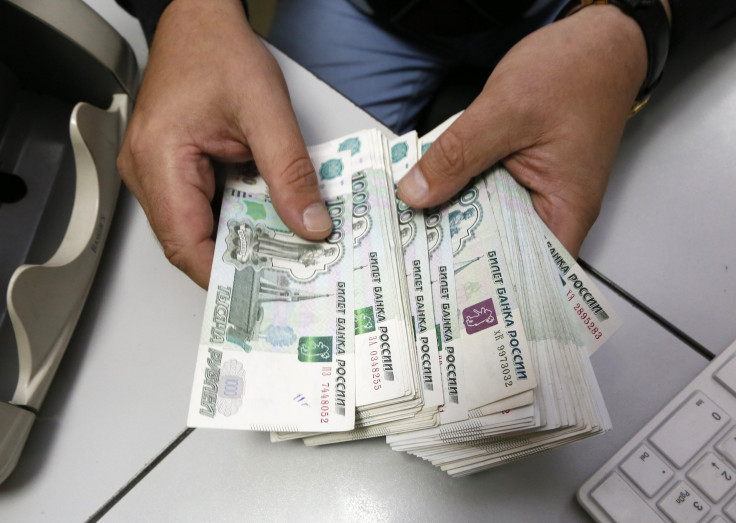Russian Ruble Crisis: Russian Journalists Split Along Ideological Lines With Economic Outlooks

As the Russian ruble continues to fall and the central bank of Russia takes measures to counter an all-out collapse, media outlets in the country, many of which are state owned or highly critical of President Vladimir Putin's government, are fanning the pro-Kremlin or anti-Kremlin flames. The Moscow Times seized on a Twitter trend to criticize Russia’s alleged involvement in Ukraine by satirically changing a formerly patriotic Twitter hashtag that reads “Crimea is ours” in Russian to “the crisis is ours.”
Typically critical outlets, like Vedomosti, partly owned by Sanoma, which publishes the largely government-critical English site The Moscow Times, warned Russia is “just a few days away from a full-blown run on the banks,” in an editorial on Wednesday, according to the New York Times. The St. Petersburg Times, a sister publication of The Moscow Times, published some critical opinions of the central bank, including a quote from Timothy Ash, emerging-markets analyst at Standard Bank, in which he called the central bank’s credibility “in tatters.”
A bank run involves large numbers of people withdrawing their money from their banks, which requires the bank to increase its cash stores. As more people withdraw money, it is a dangerous, exponential trend.
#КризисНаш is the new #крымнаш. http://t.co/EG2ghEAepv pic.twitter.com/RDUG2KS3E7
- The Moscow Times (@MoscowTimes) December 17, 2014The central bank raised the benchmark interest rates to 17 percent from 10.5 in a bid to get Russians and foreign investors to put money back in the banks. That and other central bank measures could have played into a 10 percent rise in the ruble value at the end of the day Wednesday, according to the Associated Press. Government officials have reassured Russians that the economy can weather the storm and there could actually be advantages to a drop in the price of the ruble. State-owned media fell in line with those assertions.
Outlets like Sputnik News and RT have published optimistic stories about the faltering economy, criticism of Western sanctions and the adverse effects on markets abroad. RT downplayed the current crisis by comparing it with the 1998 “ruble crisis,” the worst economic crisis in recent history in Russia. RT argued that “Russia’s balance sheet is strong enough to weather the ruble sell-off.”
RT also published tweets from pro-Kremlin Twitter accounts downplaying the crisis, like this one:
Elvira, I'm with you! #Ruble pic.twitter.com/auY6lYI5mS
— Russian Market (@russian_market) December 17, 2014ITAR-TASS, a state-owned wire, featured this story on the front page quoting Russian Security Council Secretary Nikolay Patrushev, who said Russians running to the dollar and euro and dumping rubles are making a big mistake.
A Sputnik News article said that if the Ukraine crisis de-escalates, the Russian economy would rebound by June 2015 and cited remarks by Steen Jakobsen, an investor at Denmark’s Saxo Bank, to support the argument. But the article later included Jakobsen’s position that a central bank interest rate hike on Tuesday only exacerbated the ruble’s fall, an atypical criticism from the outlet. Sputnik News also published a story about a Moscow businessman who killed himself overnight in fears of the crisis.
The pro-government Izvestia outlet published the official announcements of the central bank but did not include criticism of its handling of the ruble drop. Pravda, a pro-Kremlin news source, published some pessimistic projections in a piece titled “Russian Ruble Smashed To Pieces,” but also criticized the central bank for showing “no reaction to [President Vladimir Putin and Prime Minister Dmitry Medvedev’s] course of economic development in the country.”
For reference, a Pravda piece published Dec. 8 was highly critical of Western media positions that Putin should hand back Crimea to Ukraine and seek an end to sanctions to save the economy. It defended his high approval ratings and argued “there are very few sober assessments in the West,” about the economy.
© Copyright IBTimes 2024. All rights reserved.






















